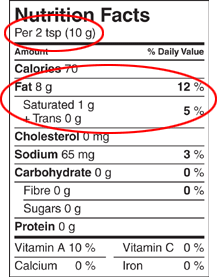People may be unknowingly consuming significant amounts of potentially harmful trans fats as a result of misleading food labels, researchers say.
The law allows foods that contain less than 0.5 grams of fat to be labeled as containing zero grams of fat. That’s because the policy requires that fat amounts less than 5 grams be listed in 0.5 gram increments, and allows food producers to round down to the lower increment. Foods with more than 5 grams of fat are required to use one gram increments.
This means if a product has 0.49 grams of trans fat, manufacturers can label its trans fat content as zero.
Consuming as few as three such food items could lead a person to exceed the recommended intake of 1.11 grams daily without knowing it, Brandt said. For example, consuming three servings of food labeled “zero trans fat,” each of which actually contained 0.49 grams of trans fat, would bring the total to 1.47 grams.
You might be eating more trans fats than you think – Health – Food safety – msnbc.com




